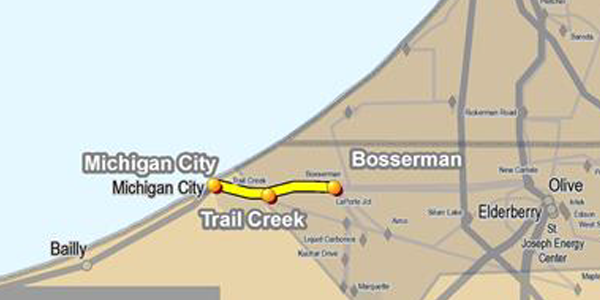MISO’s Board of Directors is expected next month to approve MISO and PJM’s first major interregional transmission project, about a year after the RTOs first recommended it.
The nearly $25 million reconstruction of the 138-kV Michigan City-Trail Creek-Bosserman line in Indiana’s northwestern corner was identified last fall in the 2018/2019 MISO-PJM coordinated system plan. (See MISO, PJM Poised for 1st Major Interregional Project.)
Project costs will be split on a 90-10 basis, with PJM covering the larger share. The 11-mile rebuild is located in MISO’s Northern Indiana Public Service Co.’s (NIPSCO) transmission zone and is expected to be in service by January 2023.
PJM’s Board of Managers approved the project at its December 2019 meeting. MISO’s board has yet to meet for a vote.
MISO’s nine-month approval lag comes because it did not have a cost-sharing plan in place for its interregional market efficiency projects (MEPs). After twice rejecting the RTO’s cost-allocation plans, Another Rejection for MISO Cost Allocation Plan.)
“Now that we have cost allocation in place, MISO is going to present this project to our Board of Directors meeting in September to put the final touches on that project approval,” MISO Economic and Policy Planning Adviser Ben Stearney told stakeholders during a virtual MISO-PJM Joint and Common Markets meeting Tuesday.
MISO staff had proposed the project not be regionally allocated in the RTO, reasoning that its 138-kV rating disqualified it from allocation beyond the transmission pricing zone where MISO’s project share is located. The RTO’s two rejected cost-allocation filings reserved regional allocation for interregional MEPs 230 kV and above.
FERC in 2016 lowered MISO’s interregional economic project voltage threshold from 345 kV to 100 kV after a 2013 NIPSCO complaint over the MISO-PJM interregional planning process.
No 2020 Coordinated Plan
There are currently no additional interregional projects on the horizon for the RTOs, which have agreed not to start a two-year coordinated system plan study in 2020.
“We didn’t find any strong issues to support a study,” Stearney said, adding that the RTOs will continue to gather and analyze historical congestion data. He said they will meet in the fourth quarter to discuss potential economic needs and the possibility of a CSP that would begin next year.





